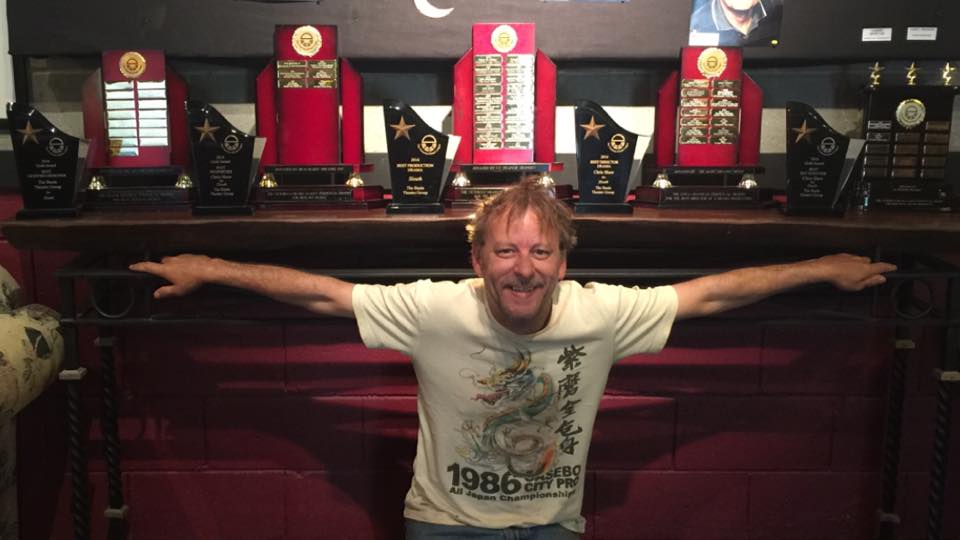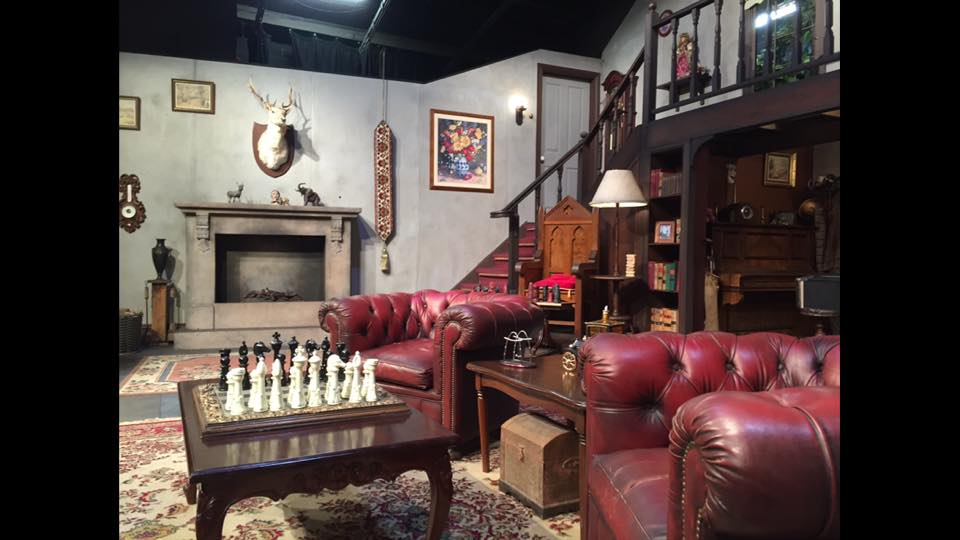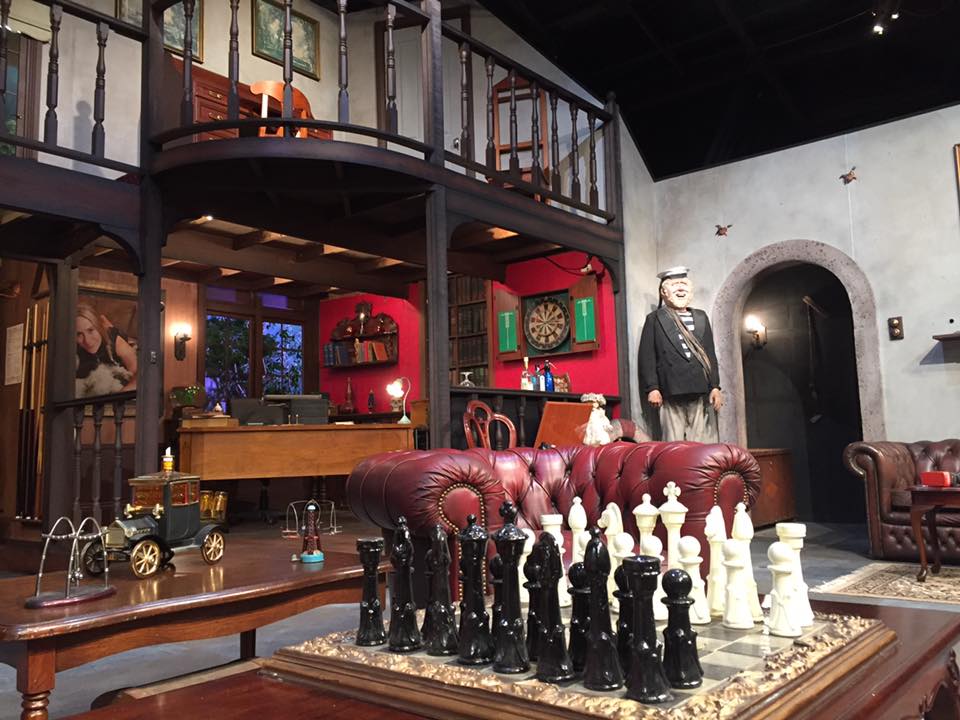by Zina Carman
Just at the end of last year, 2020, the year we were all forced into hibernation, I sat down one evening, glass of wine in hand and got on Zoom to chat with my good friend, the talented Mr Chris Shaw. We first met when he auditioned for a play I was directing in 2008 at The 1812 Theatre. He played five roles in my play, Good Mourning followed by a lead role in Lady in the Van for which he received his first ever VDL award for Best Supporting Actor.
Chris Shaw is an incredibly humble man with an amazingly creative mind for all aspects of theatre. It was great to catch up with him and hear how he became such a theatre boss!
Zina: Apart from that illustrious start at The 1812 Chris, you are known for many other attributes: a potter, a maker of complicated props, set designer, actor and now twice an award-winning director! I wouldn’t think you learnt all that at school!
Chris: No, I didn’t. I always had a leaning towards art, but Mooroolbark Tech didn’t have much of an art course and no art at all in year 12. I moved to Lilydale Tech which did have art but it was Lilydale’s first year, nothing was that organised, so it was pretty loose. A lot of time off, and you could smoke in the common room – that was a great year!
Zina: Did the freedom of that year help with creativity?
Chris: Not really, but I did get the chance to do all different art courses that year. I did pottery and as I was reading The Lord of The Rings at the time, I made a little hobbit, a wizard, and a tiny house. Then at 19 I lost my licence. We had moved to a place in Croydon around the corner from a clay factory so I made a whole heap of pots, got them fired by another potter who lived close by, took them to the Croydon market and made $360 first time! Thought, wow, that went alright! So, I kept going with it, then the mugs evolved, and here I am 28 years later!
Zina: When and how did acting fit in?
Chris: In 1990 a friend of mine asked me if I would be involved. I went along to her church, did a couple of skits and really enjoyed it. Two years later, I saw an ad in the local paper for a play in Boronia so I went down and got a part – as a dog. You pulled a little string and the tail wagged! It was a spoof of Cinderella and I was the dog narrator of the play.
Zina: So onward and upward from then on?
Chris: No, it was another two years later before anything else. I was at Dingbats in Mitcham having dinner with friends, and filled in their card which asked: ‘Have you ever thought of acting?’ It was a 6-month course at Mitcham finishing with a play. It was such a lot of fun that I immediately did a couple more plays. But then nothing until four years later, so no, I didn’t exactly jump into it!
Zina: After a four-year break, what got you back into it?
Chris: There was a play It’s Now or Never about Elvis Presley being done at Mooroolbark. From the age of 16 I’d been an Elvis fan and I wanted to do that play so badly. I actually learnt the entire play for the audition so I could do any part. There was a young guy who looked like Elvis but wasn’t prepared; I didn’t look like Elvis but I knew the whole play – it was a given, I got the lead! After that it was always 6 months or a year in between anything. It wasn’t until 2003 that I got right into it and started doing plays constantly. I’ve been in 50 plays now; that is another reason I decided to have a break.
Zina: A break from acting maybe but you still made props. How did prop making begin?
Chris: I would see something on stage and think, ‘Oh man, that could look so much better’. So sometimes I would just make something and show the director. I didn’t even ask if they wanted a certain prop made, I just made it. Sometimes they used it and sometimes they didn’t. Obviously, it wasn’t their priority, but I prefer to see something as realistic as possible.
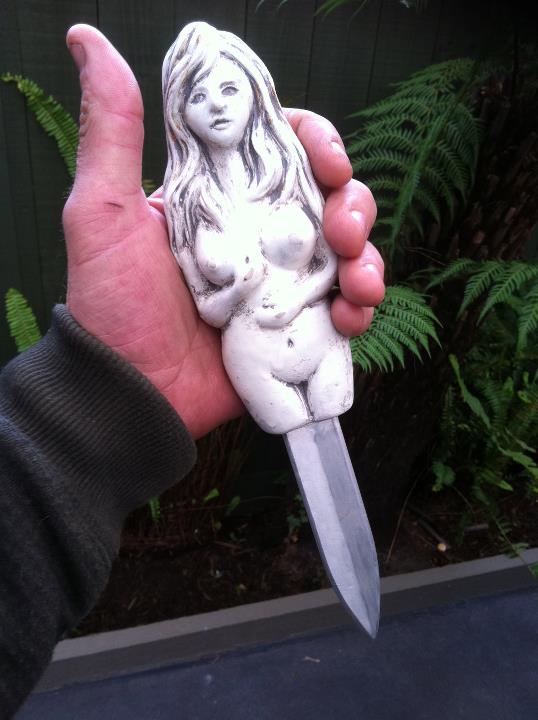
Nude Knife – Wait until Dark , Sherbrooke Theatre, 2014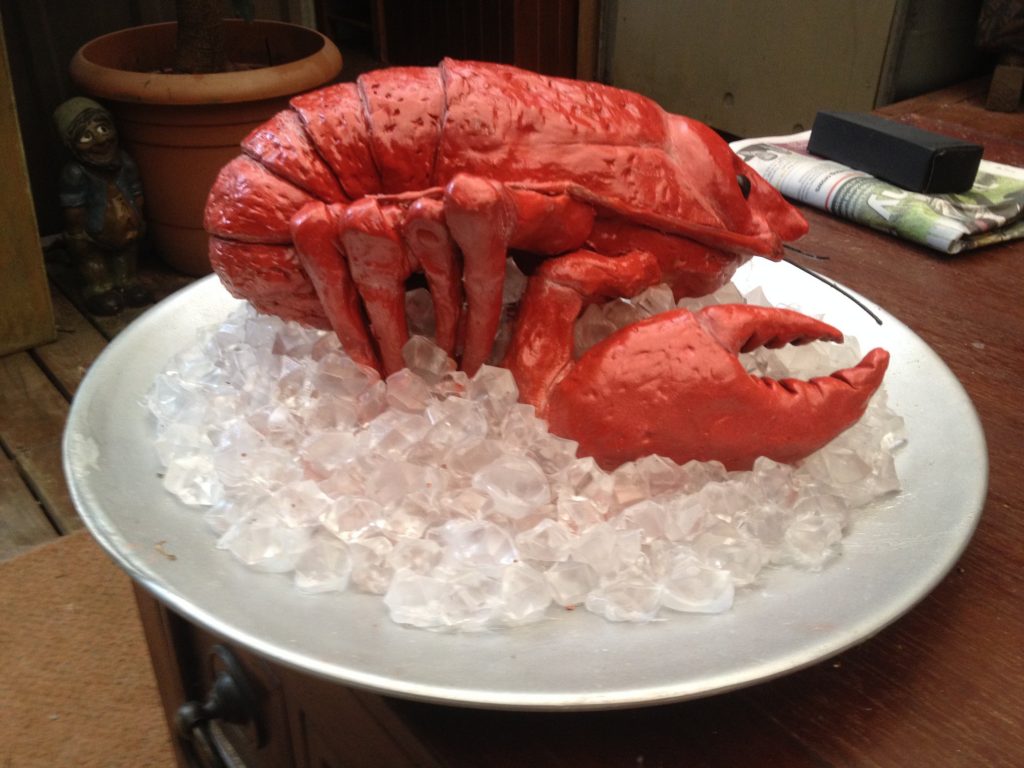
Lobster – Are You Being Served? Lilydale Athenaeum, 2013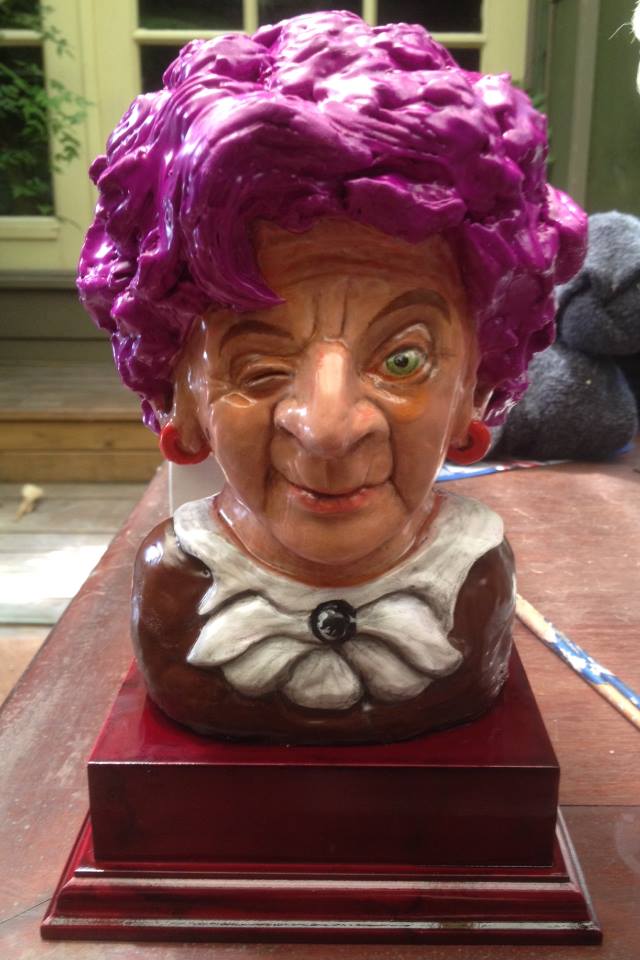
Mrs. Slocum – Are You Being Served? Lilydale Athenaeum, 2013
Giant walnut – Improbable Fiction,
The 1812 Theatre, 2012 (Sarah King, Joe Fairhurst, Jackie Hutchinson, Brett Hyland, Becky Lee, Karen Bannon, Chris Shaw front)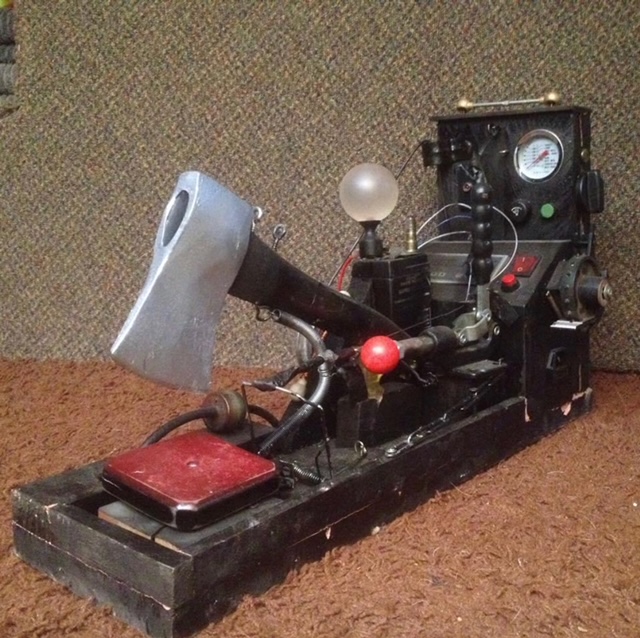
Mechanical Axe – I’ll Be Back Before Midnight, Basin Theatre, 2013
Zina: From there to directing is quite a leap isn’t it? What decided you?
Chris: A bit like the props really: I watched plays and found myself becoming more and more frustrated with what I was seeing. I was really champing at the bit to put my own slant on a play. I wanted to see how it would turn out if I had more control over the whole production; was able to say to these actors, ‘move over here’, ‘say it this way’. And the sets. I do like to see a good set that says, ‘you are here’. I’d helped build sets but had not designed one. I was just keen to see what it would be like to make something of my own rather than someone else’s.
Zina: Obviously directing first time is a bit of a step into the unknown. Were you scared?
Chris: Not scared, but overly cautious to try and get things done as early as possible. I was having nightmares about not being ready on opening night! I made the mistake of taking on everything myself. I designed the sound, the lighting, the set. I was at the theatre everyday with Gaz who was building the set to my design. I finished it off with all the painting, props, and furniture. But I found that it’s not so much the talent that people have, it’s the amount of time they can dedicate to it. You don’t have to fly by the seat of your pants and then wish later that you had done something different or better if you have time. I was lucky enough to have time to change things and I think that is why Sleuth was such a success.
Zina: You made all the props for Sleuth, didn’t you? All the special effects?
Chris: Yeah. I made the dartboard which, when the dart hit the bull’s eye, popped open to reveal a safe inside. There was a scene where we blew the safe out. It worked really well with the special effects, sound and smoke, etc, and then you could just close it up and use it as a normal dartboard. All the creatures for the ancient chess set were fun to make. The sailor I had made two years before for Malcolm Sussman’s production of Sleuth. He didn’t use it because someone else had made one and put a lot of work in. I thought I’d use it one day if I ever direct Sleuth – which I did two years later!
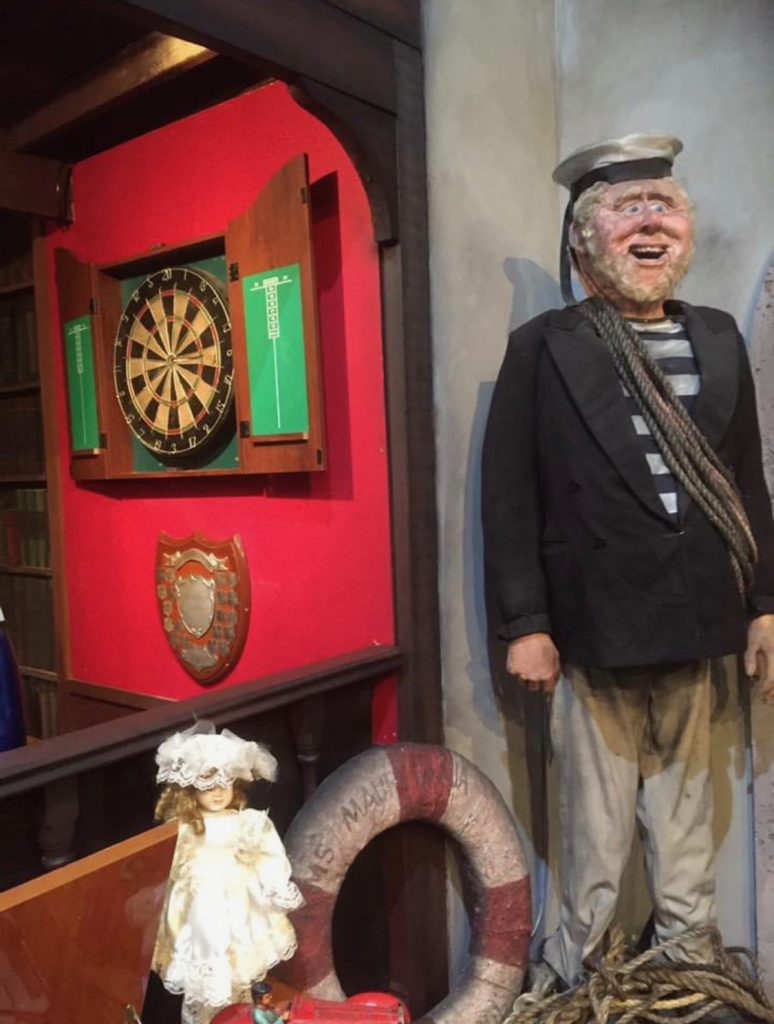
Zina: And what a success you made of it! It won a handful of VDL awards: Best Production, Best Director, Best Lighting, Best Props and Best Set! How did you feel winning all that?
Chris: It was unbelievable. We were sitting at the table and when my name kept getting called out, I kept thinking, ‘bullshit, bullshit, I can’t believe this’. There were dozens of other theatre companies there, other good plays. Here we are, Sleuth, getting called out time and time again – it was unbelievable!
Zina: Yes, you wiped the floor. All those awards are a credit to your talent, Chris. Isn’t it great to get that recognition?
Chris: Well, thanks. Yeah, it is great to be recognised. If talent is recognised, you can really go places. I guess there are things that I can do that I notice other people can’t do. Maybe I haven’t gone as far as I could, but I’m happy with everything I’ve done, happy with where I am now. if I died tomorrow, I would die a happy man. I always felt a need to prove something. Prove that I could do it, I suppose. And now I’ve done it and don’t have to prove anything else. That’s probably why I’ve taken a bit of a break; I haven’t been on stage for 3 years now.
Zina: Not on stage, no, but you directed Elephant Man in that time frame, another demanding play. Again it was a success and won awards.
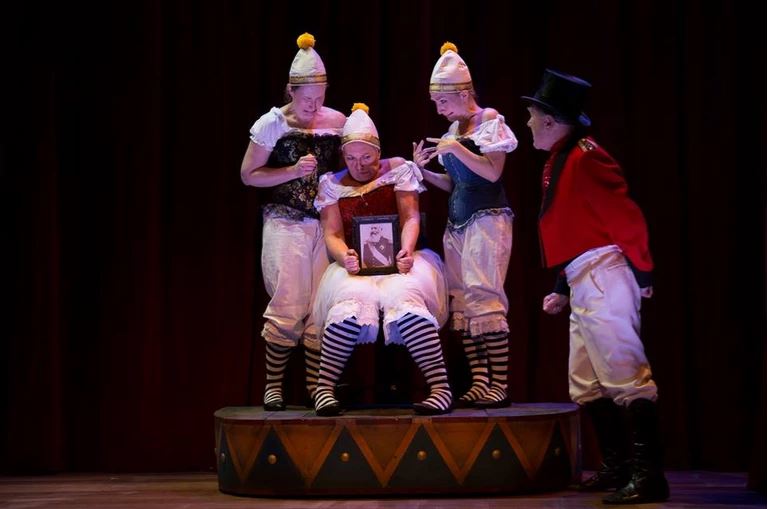
Marionettes – The Elephant Man, Lilydale Athenaeum, 2018
(Kellie Bray, Donna Cleverley, Anna Ruth Laird with Laurie Jezard)
Chris: Yeah, we won Best Lighting which I had a hand in designing with Robin Le Blond. We also won a Silver Award for the set and yes, they were great awards to get. We missed out on Best Production – Doug Bennett knocked us out with Mr. Bailey’s Minder!
Zina: I thought the props award might have gone to you too, considering the three stages of the stick church, which I thought was beautiful.
Chris: Ah yes, the church. I made three of them; they took me about 200 hours! So that was a good project. I enjoyed making those. I didn’t want them to get lost to the audience. I had thought of putting the church downstage but wanted to keep it as real as possible so left it in the bedroom.
Zina: That is true dedication to the craft, Chris! Apart from time consuming, was the church difficult?
Chris: No, the most difficult prop was the bath! The first bath I made was a long box, sort of coffin shape but there was no versatility for the actor to move around. He would have been stuck just up one end all the time. So, I changed it and made a round bathtub so the actor could manoeuvre himself around to face whichever way he needed/wanted to.
But the most effective prop I ever made was a dummy for Out of Order, directed by Bob Bramble at the Basin Theatre. I played a hobo with a suit and a bowler hat. Climbing through the sash window, it comes down, and knocks me out, hanging half in and half out of the window. In most productions, the actor just gets out of the window for interval, and the window is empty until the beginning of Act 2.
For our show, I made a dummy to look exactly like me, even my face! My brother-in-law made a mould of my head. I shaved my beard off and was breathing through a straw, it was totally lifelike! So, at the end of Act 1, I’m there hanging out the window, we go straight to black, I jump out of the window, we put the dummy there and the lights go up for interval. Beginning of Act 2 we reverse that. The review for that play was: ‘full marks to Chris Shaw for staying in the window all through interval without moving’!
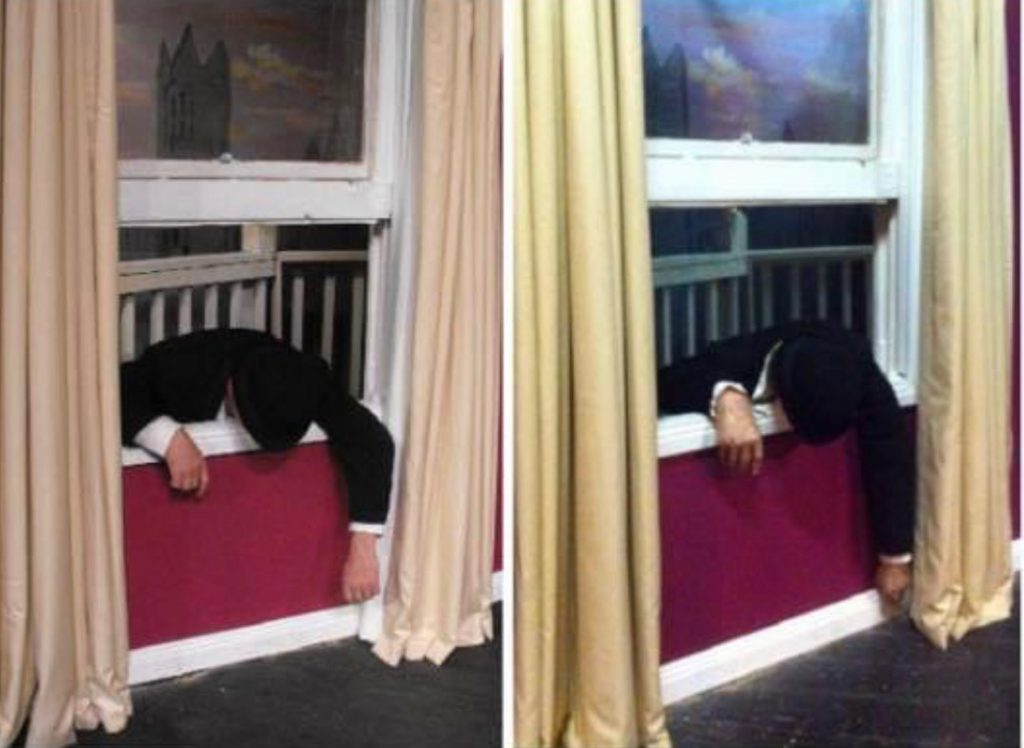
Zina: How clever, what an actor they thought you were! You do have talent though as you seem to fully embrace the characters you play – how do you do that?
Chris: It’s a freedom. It is a release from yourself. You already have the lines, you know the outcome of the situation, you know that it’s not going to end badly for you. You will be able to walk away at the end of the night and have a drink. So, it’s not a real-life situation, you say and do things you wouldn’t do normally, it’s all pre-arranged so you can be as confident as you like on stage.
Zina: I’ve never thought of it that way, that’s quite profound. So you step out of yourself when on stage. Thinking about that aspect, how did you feel taking on directing a cast for the first time?
Chris: It’s a very different feeling, not being one of the actors on stage, one of the group. Being the director down there, you feel a bit out of it, out of the loop. You’re not quite a part of the team. It’s the only thing I don’t like about directing. After rehearsal and a brief chat with the cast I would go home, think of things, and jump on the computer to put them all down. I would then send a copy to the actors so they couldn’t forget anything. I was not always popular for it! But it was OK. The best part was Janet Francis, my stage manager – she’d stay back with me every night, and we’d chat for an hour after the rehearsal. She was terrific; I always felt there was someone there I could go to and talk to
Zina: You told me that one night at the Athenaeum Theatre the power wasn’t turned on. As the director how did you deal with that?
Chris: We started the show and there was no music! Oh man, I’m just freaking out, I bolted all the way around, through the foyer and up into the bio box, over excited, saying, ‘What’s going on! WHAT’S GOING ON? There’s no power on!’ I asked the audience after the show and nope, they didn’t even realise!
Zina: We are much more critical than audiences. A director agonises over getting the right music, lighting, set, etc, but the audiences don’t realise. But those details produce the best plays, and we get to work with talented people. I know you did everything yourself for Sleuth. Peter Bartlett was involved with your sound and he told me you are very particular…..
Chris: Yeah, in Sleuth I did everything. It was a massive endeavour for me. I said ‘never again’, but two years later Lilydale and The Elephant Man came along!
Zina: And did you rely more on others for help with The Elephant Man?
Chris: Not rely on them but definitely work with them. Robin Le Blond came up with some great lighting ideas for The Elephant Man, which really lifted the play. He put in the footlights which created a really good effect. Robin was great, he was always there when I needed him. Sylvia Carr did the costumes. I always leave costumes up to somebody else. It’s one area that doesn’t interest me. I was probably still over involved though. I’ll try and avoid it next year. I’d probably still like to do sound but delegate all the rest.
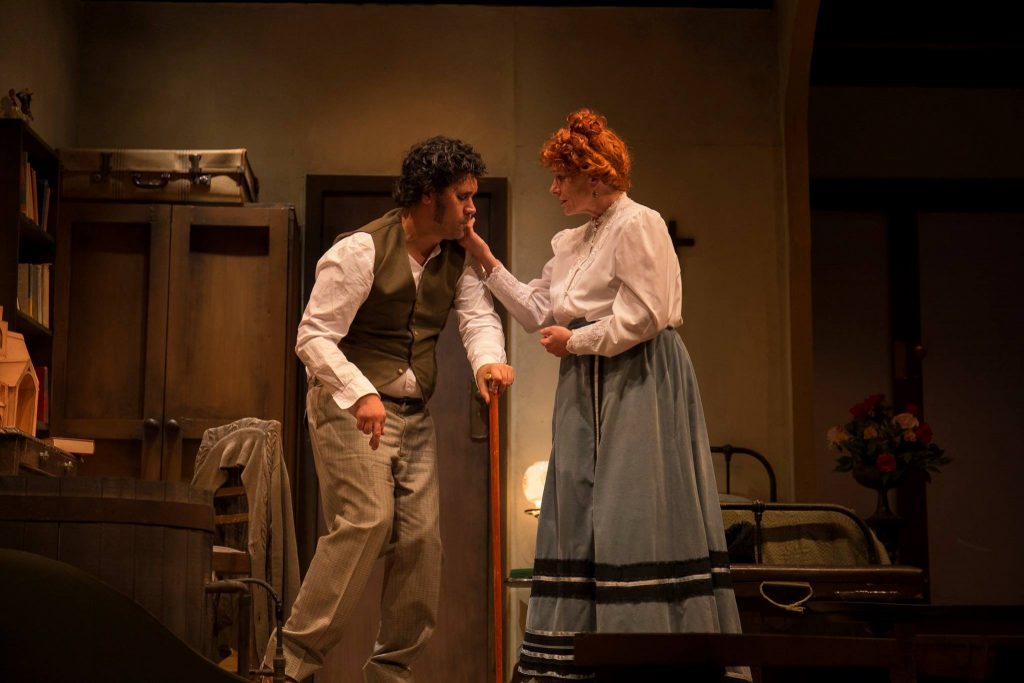
Zina: Well, we all got a break in 2020 thanks to COVID 19! Now most of us are eager to get back into it again! So, what next for you?
Chris: I was looking at doing Death Trap – but it’s just like Sleuth. It’s got all these weapons all over the walls in a log cabin. I thought, oh no, I don’t want to go there again; out in the driveway every day making props and making an elaborate set. This time I’m doing a comedy, It’s Now or Never – the story of Elvis, at the end of 2021 with The Basin Theatre, all things going well. I’ve done two dramas now and I’m keen to direct a comedy to see what that’s like. I’m hoping that it will not be as stressful, you know, more laughs sort of thing. But now not needing to prove anything, hopefully I will be more relaxed with it. For acting maybe that’s not a good thing….
Zina: I’m sure your acting will be just as good as ever, Chris, and we look forward to watching you again on stage when you decide to get back into it! Meanwhile, we wish you well with all your endeavours and thank you very much for the chat.
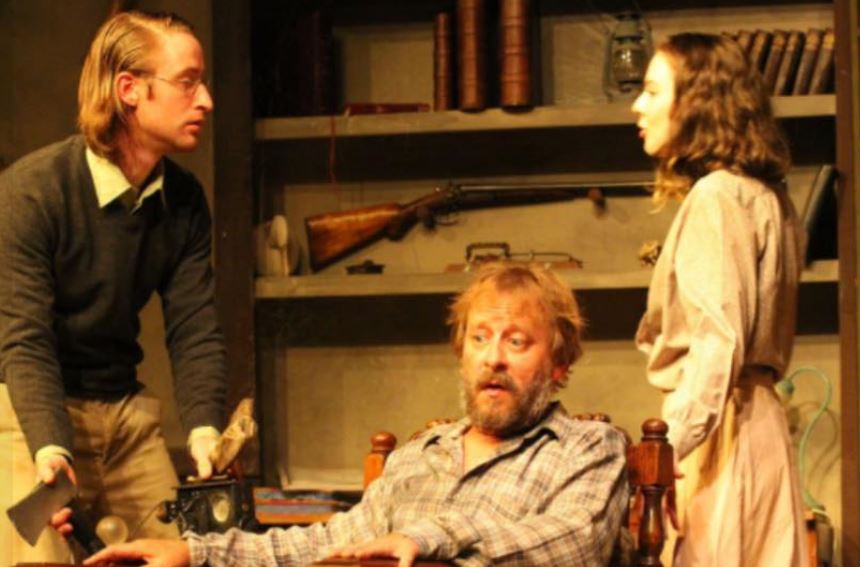
L-R: Kieren Tracy, Chris Shaw (sitting), Sarah Brighton
